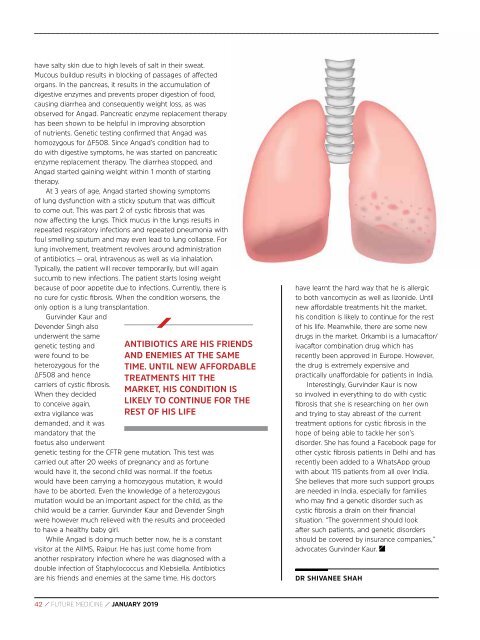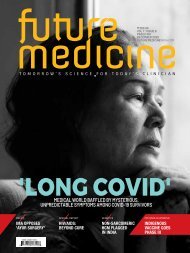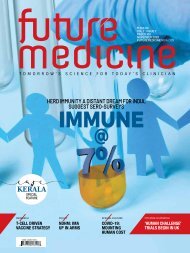FM JANUARY 2019 - digital edition
Create successful ePaper yourself
Turn your PDF publications into a flip-book with our unique Google optimized e-Paper software.
have salty skin due to high levels of salt in their sweat.<br />
Mucous buildup results in blocking of passages of affected<br />
organs. In the pancreas, it results in the accumulation of<br />
digestive enzymes and prevents proper digestion of food,<br />
causing diarrhea and consequently weight loss, as was<br />
observed for Angad. Pancreatic enzyme replacement therapy<br />
has been shown to be helpful in improving absorption<br />
of nutrients. Genetic testing confirmed that Angad was<br />
homozygous for ΔF508. Since Angad’s condition had to<br />
do with digestive symptoms, he was started on pancreatic<br />
enzyme replacement therapy. The diarrhea stopped, and<br />
Angad started gaining weight within 1 month of starting<br />
therapy.<br />
At 3 years of age, Angad started showing symptoms<br />
of lung dysfunction with a sticky sputum that was difficult<br />
to come out. This was part 2 of cystic fibrosis that was<br />
now affecting the lungs. Thick mucus in the lungs results in<br />
repeated respiratory infections and repeated pneumonia with<br />
foul smelling sputum and may even lead to lung collapse. For<br />
lung involvement, treatment revolves around administration<br />
of antibiotics — oral, intravenous as well as via inhalation.<br />
Typically, the patient will recover temporarily, but will again<br />
succumb to new infections. The patient starts losing weight<br />
because of poor appetite due to infections. Currently, there is<br />
no cure for cystic fibrosis. When the condition worsens, the<br />
only option is a lung transplantation.<br />
Gurvinder Kaur and<br />
Devender Singh also<br />
underwent the same<br />
genetic testing and<br />
were found to be<br />
heterozygous for the<br />
ΔF508 and hence<br />
carriers of cystic fibrosis.<br />
When they decided<br />
to conceive again,<br />
extra vigilance was<br />
demanded, and it was<br />
mandatory that the<br />
foetus also underwent<br />
ANTIBIOTICS ARE HIS FRIENDS<br />
AND ENEMIES AT THE SAME<br />
TIME. UNTIL NEW AFFORDABLE<br />
TREATMENTS HIT THE<br />
MARKET, HIS CONDITION IS<br />
LIKELY TO CONTINUE FOR THE<br />
REST OF HIS LIFE<br />
genetic testing for the CFTR gene mutation. This test was<br />
carried out after 20 weeks of pregnancy and as fortune<br />
would have it, the second child was normal. If the foetus<br />
would have been carrying a homozygous mutation, it would<br />
have to be aborted. Even the knowledge of a heterozygous<br />
mutation would be an important aspect for the child, as the<br />
child would be a carrier. Gurvinder Kaur and Devender Singh<br />
were however much relieved with the results and proceeded<br />
to have a healthy baby girl.<br />
While Angad is doing much better now, he is a constant<br />
visitor at the AIIMS, Raipur. He has just come home from<br />
another respiratory infection where he was diagnosed with a<br />
double infection of Staphylococcus and Klebsiella. Antibiotics<br />
are his friends and enemies at the same time. His doctors<br />
have learnt the hard way that he is allergic<br />
to both vancomycin as well as lizonide. Until<br />
new affordable treatments hit the market,<br />
his condition is likely to continue for the rest<br />
of his life. Meanwhile, there are some new<br />
drugs in the market. Orkambi is a lumacaftor/<br />
ivacaftor combination drug which has<br />
recently been approved in Europe. However,<br />
the drug is extremely expensive and<br />
practically unaffordable for patients in India.<br />
Interestingly, Gurvinder Kaur is now<br />
so involved in everything to do with cystic<br />
fibrosis that she is researching on her own<br />
and trying to stay abreast of the current<br />
treatment options for cystic fibrosis in the<br />
hope of being able to tackle her son’s<br />
disorder. She has found a Facebook page for<br />
other cystic fibrosis patients in Delhi and has<br />
recently been added to a WhatsApp group<br />
with about 115 patients from all over India.<br />
She believes that more such support groups<br />
are needed in India, especially for families<br />
who may find a genetic disorder such as<br />
cystic fibrosis a drain on their financial<br />
situation. “The government should look<br />
after such patients, and genetic disorders<br />
should be covered by insurance companies,”<br />
advocates Gurvinder Kaur.<br />
DR SHIVANEE SHAH<br />
42 / FUTURE MEDICINE / <strong>JANUARY</strong> <strong>2019</strong>


















